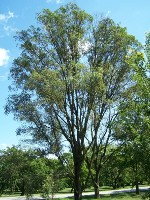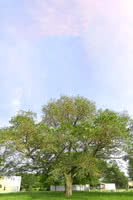Mon-Fri 9am - 5pm Mountain time
Siberian Elm vs Discovery Japanese Elm
Ulmus pumila
Ulmus davidiana var. japonica Discovery
PRODUCTION CANCELLED
NOT AVAILABLE THIS SEASON - MIGHT RETURN
Siberian Elm is a small to medium-sized deciduous tree. It has a similar form to American Elm, but smaller, with a more pyramidal habit and shorter lifespan. It is also more resistant to Dutch Elm disease and is very salt tolerant.
Siberian Elm was grown as shelterbelts in the prairies after the Dustbowl disasters, where its rapid growth and tolerance for drought and cold initially made it a great success. It is an excellent shade tree.
Note: Due to it's increasingly controversial reputation for being invasive in warmer climates, we are no longer planning to grow this species for retail purchase on a regular basis.
Discovery Japanese Elm is great for anyone who doesn't have a lot of time to maintain their trees as it doesn't drop many seeds. It has beautiful dark green foliage and is resistant to Dutch Elm Disease. This elm is similar in shape to the American Elm but is roughly 30% smaller. Instead of having an irregular and broad-shaped crown as other Japanese Elms do, the Discovery Japenses Elm has symmetrical branching, an upright growth form, and develops a classic vase-like crown.
Siberian Elm Quick Facts
Discovery Japanese Elm Quick Facts
In row spacing: 2.4 - 3 m (8 - 10 ft)

